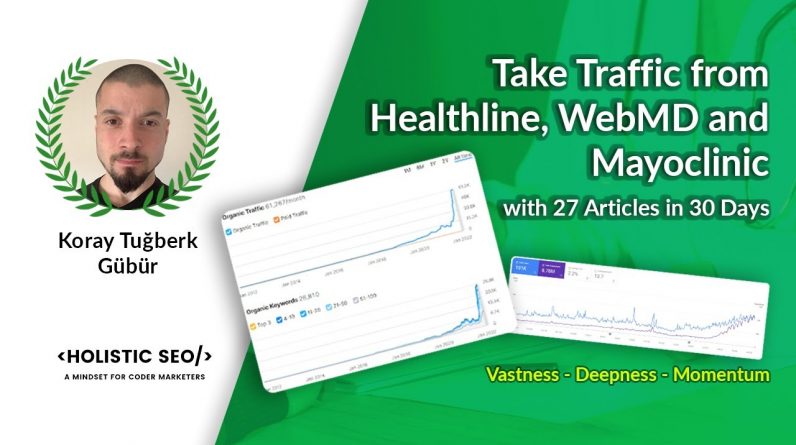
The questions that are answered in the “Keyword Difficulty SEO Case Study” video are below.
– Can a small website take traffic from global authorities?
– Can a small Topical Map be good enough to take traffic from big websites?
– How to outrank the main authoritative sources and websites?
– How to create E-A-T Signals with authoritative and algorithmic authorship?
– Why is keyword difficulty a misleading metric?
– What should be used instead of keyword difficulty?
Definition of Keyword Difficulty: Keyword difficulty is a metric from Ahrefs and SEMrush used to describe the ranking possibilities for a specific web page.
Definition of Ranking Difficulty: The ranking difficulty is another name for the keyword difficulty with a broader aspect. Rather than focusing on a specific keyword, it focuses on broader aspects.
Why is Keyword Difficulty a Misleading Metric? Keyword Difficulty is a misleading factor because it doesn’t provide search engine understanding, or search engine communication. Since semantics and semantic SEO are more important for overall rankings and authority signals, it is hard to show a keyword difficulty metric. The better option is Quality Threshold.
What is Quality Threshold? The quality threshold involves a quality score to be exceeded for being ranked for certain queries in the main index, rather than a supplemental index. Being served and being indexed are not the same thing.
What is Relevance Threshold? The relevance threshold and quality threshold are not the same things. A web page can exceed the relevance score, but it might not be quality at all. The relevance threshold should be exceeded to be a candidate; the quality threshold should be exceeded to be a representative web page for the other candidates.
Does Google consolidate the ranking signals on representative web pages and sites?
Yes, Google consolidates the ranking signals on representative web pages and sites. Rather than ranking and sorting all of the individual web pages and websites for a topic, Google consolidates its overall quality and relevance for certain web pages to be sure that they cover every angle that can happen via a query.
What is Predictive Ranking?
Predictive Ranking and Information Foraging are related. Information Foraging is the ordering of information for expressing an organized thought for a certain group of sources and queries. Predictive ranking tries to understand what is the best possible organization for the information for a certain query by testing and re-ordering and re-structuring the results.
Predictive Ranking is a way of understanding the search engine perspective for the dancing Google results.
How to use Quality Threshold instead of Keyword Difficulty? To use the quality threshold instead of Keyword Difficulty, SEO should cover all of the angles for a small topic. Vastness, deepness, and momentum are three principles for quality thresholds. A topic should be processed with more angle, with more detail, and with more activity.
The topics in the video:
00:00 SEO Case Study and Keyword Difficulty
01:00 Topical Map and Context Vectors for Quality Thresholds
02:00 Taking Traffic from Healthline, WebMD, and Mayoclinic
03:00 Small Topical Map and Budget for Dominating Strongest Queries
04:00 Web Page Count and Website Background
05:00 The Reason for the Keyword Difficulty Video
06:00 Link Inversion and Representative Source
08:00 Semantic Content Networks with Quality Signals
09:00 Importance of Quality Thresholds and Predictive Ranking
11:00 Quality Signals and Quality Threshold Exceeding
12:00 Publishing More Quality Pages
12:30 Propagation of Quality to Web Pages
13:00 Publication Frequency
15:00 Identity of Website for Quality Thresholds
16:00 Originality of the Content
17:00 Document Popularity for Queries
18:00 Processing Documents and Cost for Search Engines
19:00 Unique Images and Branded Images for Originality
20:00 Initial Ranking Scores and Quality Scores
21:00 Source for Knowledge Base
22:00 Negative Ranking State
23:00 Trustworthy Sources and Being Classified with Them
24:00 N-grams and Unique Answer Terms
25:15 Topical Coverage and Page Count
27:25 Supplemental Index and Quality Thresholds
28:30 Google and Ranking Preferences
30:00 Google Author Understanding and Quality Signals
31:30 Notes for Authorship and Quality Signals
33:00 Relative Quality Difference for Being Ranked
33:30 Outro with an Originality of Content Joke
The Official Website: https://www.holisticseo.digital
The Official Twitter Account: https://twitter.com/KorayGubur
The Official Facebook Account: https://www.facebook.com/koraytugberk.gubur.948/
The Official LinkedIn Account: https://www.linkedin.com/in/koray-tugberk-gubur/
The Official Pinterest Account of Koray Tuğberk GÜBÜR: https://tr.pinterest.com/koraytugberkgubur/
The Official Instagram Account: https://www.instagram.com/koraytugberkgubur/
Official Email Address: ktgubur@holisticseo.digital
#seo #keywords #keywordifficulty

